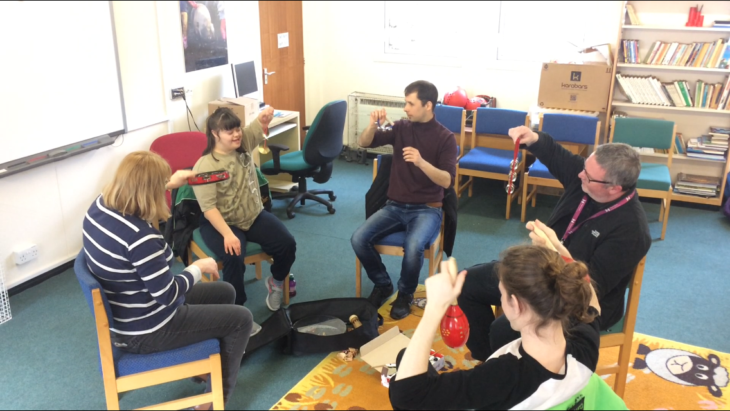Promoting control, agency and choice
United Kingdom
- Children
- Disability
- Young people

In early 2018, we received an inquiry from a carer working with young people with disabilities, who was interested in building musical opportunities at his activity centre, Dell Farm. This was in fact one of the local outposts of national charity MacIntyre – from which its No Limits programme supported children and young people who could access mainstream education. They had a weekly visiting musician already, but wanted to ensure many more children could access music, and more regularly.
We worked with the MacIntyre caregivers to tailor a music training project to fit their ‘bespoke’ service, which catered to a wide range of complex needs across a wide area. This meant bringing staff members together from four different local branches for training afternoons. It also meant ordering three sets of instruments on wheels! Susanna Bajali, a new recruit and Advisory Panel member, delivered the training over seven weeks, beginning in January 2019.
The group of five learners divided naturally into two groups, meaning there was space to give each learner a lot of individual attention. Each brought their own one-to-one support worker, to whom Susanna gradually transferred skills and techniques to use in their care. Staff were excited but nervous to begin, and in the first session instruments were simply passed round, with participants listening to one another’s sounds and movement, and the group discussing the broad aims for their project.
Instruments are picked up and tried out, passed around, and quite soon spontaneous musical dialogues and interactions are taking place. There are smiles and giggles from the service users and general enjoyment all round.
Susanna Bajali, music therapist
Over time, both groups found that the activities that worked best were those which gave the service users’ control, agency and choice. By the end, all staff were leading their own sessions, despite finding it daunting at first. They reported feeling that overcoming the fear of leading, and singing in particular, had boosted their confidence and was in fact ‘what was good about it!’
In a final, seventh session, without the learners present, the group reflected on how the music had helped them connect with their learners by seeing more clearly their internal, emotional world. By giving their young people new opportunities for agency and self-expression, the staff had seen new sides of them too.
Let the learners lead, let them do it – don’t take over!
Staff member
Though six staff members were trained, they covered a wide area in the region. This meant that the new skills the staff gained created the opportunity for 150 vulnerable young people to access music as part of their care, as well as the original five learners who took part. Staff left feeling like they had new tools to understand the young people in their care, and the learners having experienced music as a means of self-expression and choice making.
The most important thing I have learnt is that music has such a deep effect on people, on very deep levels.”
Staff member
Related projects
-
On-site skill-sharing: MacIntyre No Limits (Luton) 2019
United Kingdom
- Disability
- Young people
